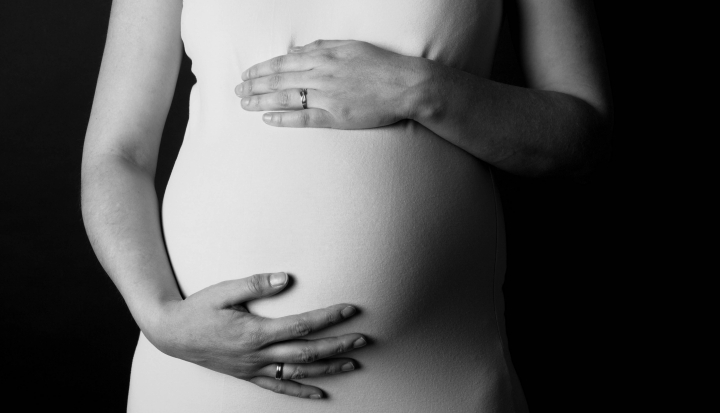By Father James Tunstead Burtchaell, C.S.C.
This essay appeared in the May 1988 issue of U.S. Catholic (Vol. 53, No. 5, pages 29-31).
Ruth and Paul came by last November on their first visit since their wedding the year before. There was so much to tell: his Air Force assignment, her mother’s health, their homemaking at a distance from their friends. Then, in an entirely different mood, Paul turned and deferred to Ruth to share with me their most serious news: that she had miscarried their child. The telling of it left the three of us quiet for a while.
Her friends had not been silent, she said. One told her, “It was so early (she had been three months pregnant)…it’s not like losing a baby, is it?” Several offered another consolation: “It was nature’s way,” since so many miscarriages are triggered by serious fetal defects. Or: “You’re just starting your family; you’ve plenty of time to have other children.”
People seem compelled to say something timely to a friend in this kind of mourning. This couple knew their friends spoke from compassion and concern. But everything they said only aggravated the pain. Ruth was especially offended by the suggestions that her child had been negligible because it was so underdeveloped or wrongly formed or replaceable. “From the first moment I knew I was pregnant, I went on full alert. I really don’t think I could have been more devastated if the child had been born and then had been lost.”
Quickening used to be the moment not when a child sprang to life but when a mother sprang to new life when she first felt her offspring kick within her. Nowadays that arousal to motherhood comes much earlier. With the throbbing heartbeat overheard by magnified sound, the uterine acrobatics overseen by ultrasound imaging, or even the simple chemical pregnancy test, a woman is transformed by the knowledge that she is carrying a child. According to Ruth, the child may have been small, but her awareness of the child was as full-formed as could be.
I was reminded of what other mothers had been telling Phil Sopke, C.S.C., one of my students who was doing research on the experience of miscarriage, stillbirth, and newborn death.
“When we found out that I was pregnant, we started talking about how we would raise the baby. We wondered who it would look like. We got the nursery all set with toys, blankets, clothes, and cute decorations. It was an exciting time.
“By the time a woman is three months pregnant, this kid had already gone through college in her mind. She has already zoomed ahead to the 20s, the adulthood of the infant.”
Ruth’s loss, which the well-meant comments of family and friends only intensified, was not a rare one. Children are miscarried, it is reckoned, in as many as one in six pregnancies; the figure is easily doubled if embryos spontaneously aborted early without knowledge of the mother were to be included. One child in 80 is born dead. Sit a half-dozen women down to lunch, and there will be stories of children lost. And most of them will probably say it was one journey in their lives they had to trek alone without much help.
For many women it brings emotional whiplash. Body and soul have been opened in welcome, and the new arrival perishes without even a farewell embrace. Sopke portrays this frustrating in his title: “Hello and Goodbye in a Single Breath.”
A grieving mother will commonly be driven to ask: “Why?” The force of her distress may provoke her to startling and unprecedented feelings of rage against God. If the question becomes, instead, “Why me?” she may turn the anger on herself as a failure. She may see the loss as a punishment for past faults or as a failure in her capacity to bear a healthy child. Either way, the blaming can be destructive. An aggrieved mother can lose sight of the fact that the life God gives is immune to death and suffers defeat only from moral corruption. Or her own sense of failure can lead her hastily and unwisely to beget a “compensation baby” to reassure herself that the jinx has passed.
Mourning a child lost so early is a stifled sort of grief. A child unnamed is an it rather than a daughter or a son, Sheila or Teddy. Also neither church nor culture takes public notice of the loss of a child who “has never quite arrived.” The New World seems to have lost the customs of mourning of the Old World, where families wore somber apparel to remind everyone that they were grieving and needed time apart from the regular round of social merriment. Those close and caring were put on notice that this was a withdrawn season for the mourners, a time to sit quietly with them. And custom even prescribed how long one ought to mourn a lost brother or mother or husband or daughter. Yet even the Old World seems not to have known how to help parents mourn their unborn children.
After miscarriage or stillbirth the father finds himself often excluded from the very intimacy that gave them their son or daughter, and he may be unable either to grieve or to console. A father has only moments or hours to bond to a dead or dying child who has been the mother’s continuous preoccupation for months. If he is insensitive, he can powerfully offend his wife by being one of those who tells her it is a loss they can write off or by telling her prematurely that it is time for her to quit the grieving and get on with life. If he is sensitive, the frustration is his, for never has he tried so intently to be close to his suffering wife; yet never has he felt so kept at a distance. Brothers and sisters are given no say in the bewilderment they share. So many others who want to be supportive feel like intruders. And at the center of those circles of sorrow is a woman alone.
It is so different with pregnancy’s other aftermaths. When a child is born, a mother is the center of intense gatherings: to see the child; to listen to the story of delivery; to bring gifts; to share the joy; to dedicate the child in baptism and promise to pass on all good gifts, especially faith and hope and love, the richest of gifts.
If a child is born soon to die, the parents are surrounded by friends who accompany them to the baptism and the funeral and who, even beyond the grave, know how to continue special affection and attention. Even the most violent of outcomes, an abortion, can after years of denial find an accompanied grief and a forgiveness and restoration that the clergy and other reconcilers know how to share. It is odd that though miscarriage and stillbirth are not stifled by the furtiveness and shame of abortion, the Christian community can seem even less adroit and adept at assisting the woman who has lost her unborn child.
As a community of faith, we Christians rarely are left speechless and paralyzed in crisis. We are carriers of a sacramental sense. When the mystery of the Lord’s death for us—and ours to him—gets especially close to us with its voltage, we have ways of word and gesture that pull us back from chaos into the sense and vision of grace. Words wiser than our distress would utter are provided for us. Gestures worn through dozens of generations of grieving are ready for us when we are frozen in confusion. Why—of all times—is the church so muted and awkward at the sight of parents whose children are the most bewildering to mourn?
Paul and Ruth’s visit put me in mind of Lucy and Germain, who lost their third child to a defective heart after only two days. The hospital staff had surrounded them with discreet yet active affection. The couple had held the small, spend body for a half hour after she died; and the nurse gave them a Polaroid keepsake of themselves with Mary Lee; a photo that looks like the Holy Family…and is. Their families flew to them. I had the undertaker prepare Mary Lee’s casket so that she could be viewed and witnessed. The parish crowded to her funeral; and Jimmy and Tricia, 4 years old and 2, came to the graveyard to help them always remember their younger sister who had so quickly passed them by. And a potluck, cry-eyed supper held everyone close that evening, with a promise of continuing fellowship in evenings to come.
Then I think of Betty and rick, whose third child was dead at birth. There had been no funeral, no swarming of loved ones; only estrangement for her, ineffectual misery for him, and an unsettling season for the children. No one knew what to do.
We Christians cannot take away our friends’ losses or grief, but we can help them unsnarl their confusion and ease their alienation with our lively faith warmly enacted. It is a tradition of Catholics that less sacramental, less embodying Protestants sometimes wistfully admire. A friend of mine, a Methodist military chaplain, recounted to me how he and a Presbyterian colleague were both called out one morning when a young midshipman had been found dead at the naval-training station. They were standing side-by-side at the morgue, awkwardly wondering what to do as they faced the long-since-stiffened body on the slab. One whispered, “What do we do now?” the other replied, “Let’s baptize him.” And that is what they did, with the same absurdity that leads Catholic clergy occasionally to baptize, anoint, or absolve corpses.
It is difficult to say what is more deplorable when we desperately throw a sacrament after someone who is already dead: the implied belief in a God who will not clasp God’s own children unless the Church has duly certified them; or the sad, mad clerical notion that we have a power to redeem people even when they cannot respond to our call.
When a little baby is lost, she needs no commendation from us to find a welcome in the everlasting arms. But those who have lost her, those whose parenting has been stillborn—they need the strength of our faith and hope and love leaning into theirs.
We Catholics need a rite for the family and friends of children lost before birth. We need a gently but explicit celebration when life and death collide and merge in this abrupt way. The Lord gives and the Lord takes away; we need to ratify that what he gives is not what he takes away. Every church should have such a rite, fashioned from the community’s mournful and saving experiences. Last year a young couple many thousands of miles from home gave birth to a stillborn son. The grief was aggravated by a vexation that threatened to put them at odds with each other. Only after an intense and tormented time of mourning were they able to compose themselves and this message that went out to their friends:
Richard William Schuyler
Stillborn, Feb. 3, 1986
Richard,
You entered this world
eyes closed, still body at peace,
perfect child, silent promise of a future…
You filled our arms briefly,
our hearts forever.
You are a seed of strength between us, your parents;
a source of renewed faith and reaffirmed commitment
to a changed world where children enter
with eyes open, hearts beating strong
to fulfill their promised future.
Very few aggrieved parents could come through their mourning by themselves like this man and woman had to. The community of faith owes to such parents the loan of feelings, thoughts, and words to tide them over to a time when they can lend theirs to others who come later into that same child-given, child-losing grief.
Image: Flickr cc by Tatiana Vdb














Add comment